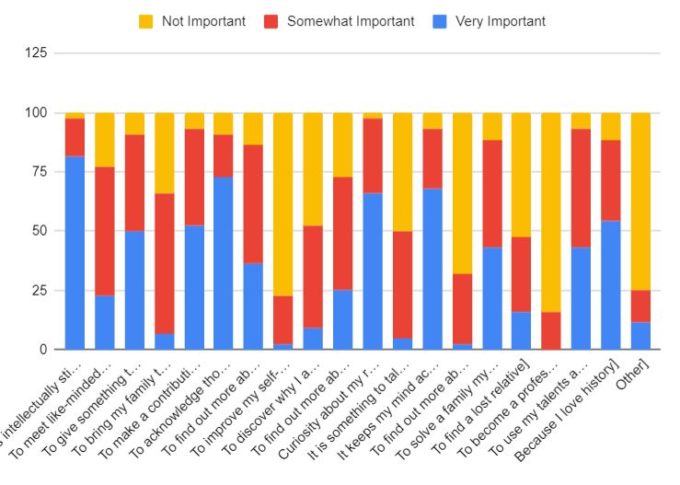More than I expected, 44 people, responded to the survey posted last week.

This summary of the responses to each suggested reason show the top three motivations with a “very important” response were:
-
- Interlectually stimulating (82%)
- Acknowledge those who came before me (73%)
- Keep my mind active (68%)
The top “not important” reasons were:
-
- Become a professional genealogist (84%)
- Improve my self-esteem and sense of worth (77%)
- Other (75%) — meaning the questions captured most of the motivations.
Compare these to the results from the Australian survey reported in the Moore and Robinson (M&R) article What Motivates Family Historians? A Pilot Scale to Measure Psychosocial Drivers of Research into Personal Ancestry
For “very important”:
-
- Curiosity about my roots (76%)
- Acknowledge those who came before me (75%)
- Because I love history (68%)
For “not important”:
-
- Other (79%) — meaning the questions captured most of the motivations.
- Become a professional family historian (69%)
- Improve my self-esteem and sense of worth (66%)
- M&R found the questions could be grouped into three broader motivations, self-understanding, altruism and cognitive challenges.
Applying the same groupings to this survey altruism was the leading motivation for 24 respondants. According to M&R “higher scores on the altruism motive were characteristic of those who had more descendants and who were more generative, that is, oriented toward assisting and leaving a legacy for the next generation. The higher levels of conscientiousness and openness to experience of these individuals also points to a sense of personal maturity that might reasonably characterise those with the psychosocial resources to contribute toward the welfare of others, particularly with activities that strengthen family ties.
Cognitive challenges was the dominant motivation for 13 respondants. M&R “those more strongly motivated by the cognitive challenges of family history research tended to be more highly educated and to spend more time on their genealogical activities; this pattern of associations is consistent with the motivational construct we were attempting to measure with the Cognitive Challenge subscale. It indicates an interest in intellectual endeavours, puzzles and mysteries, and the at-times addictive quality of these interests.”
The self-understanding was the leading motivation for 6 respondents. M&R comment “Individuals whose motives toward self-understanding were stronger were also more likely to be adopted, have half-siblings, and/or have had a DNA test. These associations independently suggest a lack of knowledge about biological and ancestral roots (for example, possibly unknown biological parents or grandparents). The finding of lower levels of emotional stability among those with higher scores on the self-understanding motive fits with the notion that there may be some distress associated with lack of knowledge about one’s ancestral and cultural background. The lack of knowledge may point to feelings of not belonging and of not being sure of one’s place in the world, and even a weakened sense of identity.”
One person’s responses showed the same level across all three motivations.
The sample size is too small to consider these results anything but interesting and food for thought. Amateur family historians do have a variety of motives, something organizations catering to the community need to keep in mind.


One Reply to “What Motivates Family Historians? Survey Results”